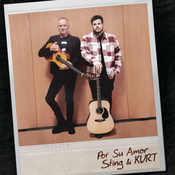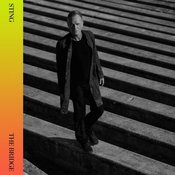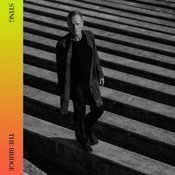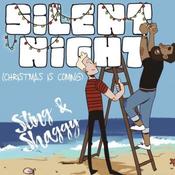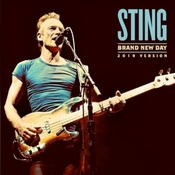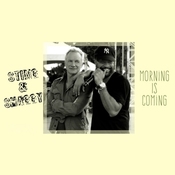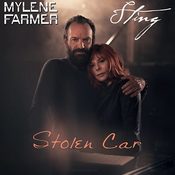All This Time, CD
Soundbites
Released in early 1991, 'All This Time' was the first single from 'The Soul Cages' album. An obvious choice for first single and easily the most radio friendly track, the single performed surprisingly well in the States where it reached the #5 position. The track was an ever present on the 'Soul Cages' tour, usually opening the set, and then disappeared for several years before reclaiming (to the joy of most fans) it's place in the set list on the 'Brand New Day' tour. The single (like it's successor, 'Mad About You') was available in a five different official formats, 7", 12", cassette, jewel case CD and digipak CD. Indeed, the jewel case CD single was further available with a limited edition 12" art print of the album artwork. Present on all versions of the single was the track was the plaintiff instrumental 'I Miss You Kate' and the 12" and CD versions of the release also included a live version of The Police song 'King of Pain'. The promo video for the song was a jokey affair which interestingly also featured Trudie Styler and Sting's co-star from the 'Stormy Monday' movie, Melanie Griffith, both as dressed as French Maids.
"The river is a symbol of continuity, the river keeps flowing and culture follows culture and is superseded by culture and is destroyed and vanishes and yet the river keeps flowing. In the song I wanted to give this idea of transcience of cultural fetishism or cultural artefacts that don't last for ever. Even the most enormous cathedral will dwindle away to nothing one day, and yet the river will still flow."
Sting, All This Time CDRom, '95
"Most people who listened to the new album said they didn't like it the first time, but it grew on them. It's much more layered than my stuff used to be. I think my intention is to implicate the listener, rather than impress him immediately. You'd be surprised that the basis of 'All This Time' the most recent single is actually a piece of Bach - really pretentious, but it's true. The way the chorus comes in is lifted from the first cello suite. And the lyrics I wrote in Normandy. I went to Normandy one weekend when I'd just started the album and I stayed in the hotel that Proust used to stay in. So I got his room: OK, I'm in Proust's room, Remembrance of Things Past and all that, right, sat down and looked at the sea. Wrote a few images down, a bit of free association, and then after a while you get some idea of a structure. Songwriting has always been a miraculous process which is incredibly satisfying, and I don't necessarily understand how it's done. And, for me, it happens with less and less frequency, actually. Which is scary, I suppose."
Sting, The Independent, 2/91
"The song 'All This Time' was really about the transcience of culture, how one culture replaces another and then in turn is replaced. What we think of permanent is in fact far from permanent. The town I was born and raised in is a very interesting place. It was the last outpost of the Roman empire - they built a wall across the north of England from the west side to the east side and the last place they built was called Segedunum which means the 'end of the wall'. So I was born in Wallsend. They tore down my house and they revealed this roman site, this fortress, and the shipyard was at the end of the street was built over a temple to Mithras. There was all these elements in this town - it was an industrial town, it had a coalmine at one end and a shipyard at the other and I used to watch the nearly 11,000 workers go to the shipyard every morning past my house and occasionally the Queen would come down the street in a big Rolls Royce, to launch a ship. It would take a year to eighteen months to actually build a ship from some of the superstructure to the whole thing, and then they'd launch it out to the river and it go away to sea. And I suppose, if I was looking for a metaphor for the rest of my life it would be that - somebody that travelled, someone who left town and never came back."
Sting, All This Time CDRom, '95
"It's about the death of my father, so its pretty dark as a record but on this song the words are foiled by this fairly jolly tune. That's something I like to do quite a lot, combine dark subject matter with up music. No, its not based on a dream. The lyrics seem surreal, but they are all images I remembered from my home town: ferries, priests, shire horses. I grew up by the shipyards. I just wanted to escape. I suppose it was quite a surreal place, though. It is the landscape of my dreams."
Sting, Independent On Sunday, 11/94
"The image of the boat is a very important one. They keep finding old boats buried in the ground (in Newcastle). That's where they buried people. They buried them in boats, like huge coffins. The boat takes you to the other world. I think Egyptians believed the same thing. So the boat is both a symbol of escape and salvation, but it's also a symbol of death and burial. I was obsessed by this idea of burial at sea."
Sting, St Paul Pioneer Press, 8/91
"'All This Time' sounds kind of poppy but it's a serious attempt to look at ritual and the inadequacy of ritual in our lives. The young guy is trying to deal with the death of his father, and instead of going through the Catholic last rites, he wants to bury his old man at sea. He looks at the river as a symbol of continuity. The song basically says, 'Well, the Romans were here 2000 years ago and their religion was very important, but it went. Then Christianity happened and that seems to be inadequate now. Let's look for bigger systems of continuity, like the river, this old religion.' The song is a kind of black comedy. I'm not really anti-religious. I'm just poking some light-hearted fun and also asking pragmatic questions about it."
Sting, Rolling Stone, 2/91
"'All This Time' is a black comedy song. Two priests are at Billy's father's deathbed - he's been injured in a shipyard accident - and Billy doesn't want the ritual that's being served up, he wants to take his father and bury him at sea. There's something very funny about that. And the old man doesn't want their bungling either. The priests say things like, 'Blessed are the poor, their reward will be in Heaven', and the father says, That's crap, we want it now! I think my dad was like that. He did receive the Last Rites, but I think he died angry. And I was angry with him. I was angry at the whole fucking situation. And there wasn't time to sort it out."
Sting, Q, 2/91
"It's from a period of my teens, the Stax thing, Otis Redding and all. I wouldn't say that it's a happy song, but it does have a wry sense of humour. Macabre, really - a black comedy about this guy who takes a corpse out to sea to bury it. It set a mass of echoes off in my mind about the way that the Norse would float their dead out on the ocean and set them on fire."
Sting, Creem, 2/91
"Free association leads us to the collective unconscious. Birds symbolise death in myth, certainly - in Jungian terms. Once you start accepting these archetypal images they just keep occurring. The songs (on 'The Soul Cages') stand scrutiny because they were written almost unconsciously. The fragments that they're built from are from the subconscious. The art of putting them together was crafted, but the inspiration was very natural, almost automatic."
Sting, Musician, 8/91




